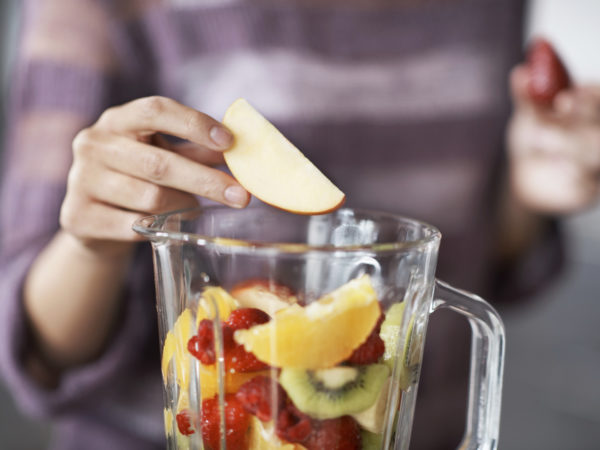Eating To Avoid Breast Cancer?
I understand that women can lower their risk of breast cancer by consuming a lot of fruit and vegetables, and also by timing dinner properly. Can you tell me how much fruit and vegetables and what time is best for eating dinner?
Andrew Weil, M.D. | October 1, 2018

A study from the Harvard T. H. Chan School of Public Health published in July 2018 found a lower risk of breast cancer – particularly aggressive forms – among women who eat lots of produce daily. Specifically, those who consumed more than 5.5 servings of fruits and vegetables per day had an 11 percent lower risk compared to those who ate 2.5 or fewer servings. The researchers defined a serving as one cup of raw leafy vegetables or half a cup of raw or cooked vegetables or half a cup of chopped raw or cooked fruits. They also found that regular consumption of cruciferous vegetables such as broccoli, Brussels sprouts and cauliflower and yellow and orange vegetables was associated with significantly lower breast cancer risk.
To arrive at these conclusions, the researchers analyzed diet questionnaires submitted every four years by women participating in the Nurses‘ Health Study. There were 88,301 women involved in this study starting in 1980 and 93,844 more starting in 1991. Besides information on diet, the questionnaires asked about potential breast cancer risk factors such as age, weight, smoking status and family history of cancer. And to determine associations between consumption of fruit and vegetables and specific types of breast cancer, the researchers also analyzed the hormone receptor status and molecular subtype of any tumors that developed in the participants. In this way, they found that higher consumption of fruits and vegetables was linked with a lower risk of more aggressive cancers.
In earlier studies, these same researchers found a link between higher fiber intake and lower risk of breast cancer. But the effect of fruit and vegetable consumption appeared to be independent of the amount of fiber in them; possibly, their content of antioxidants and micronutrients accounts for the reduction in breast cancer risk.
As for the timing of dinner and breast (and prostate) cancer, a study in Spain showed that eating early and having several hours between mealtime and sleep are associated with lower risks.
Researchers from the Barcelona Institute for Global Health (ISGlobal) interviewed 621 men with prostate cancer and 1,205 women with breast cancer and compared their answers with those of 872 men and 1,321 women who were unaffected. The results showed that the risk of both types of cancer were 20 percent lower among men and women who went to bed two or more hours after dinner compared to those who went to sleep immediately afterward. The actual time of day that dinner was eaten seemed unimportant – the risk was the same among study participants who had dinner before 9 p.m. compared with those who ate after 10 p.m.
Study leader Manolis Kogevinas said that if confirmed by future research, the new findings could be particularly important in southern Europe, where people tend to dine late. If you are in the habit of eating late, you might be better off having dinner at least two hours before your bedtime.
Andrew Weil, M.D.
Sources:
Maryam S. Farvid, et al, “Fruit and vegetable consumption and breast cancer incidence: Repeated measures over 30 years of follow-up.” International Journal of Cancer, July 6, 2018; DOI: 10.1002/ijc.31653
Manolis Kogevinas et al, “Effect of mistimed eating patterns on breast and prostate cancer risk.” International Journal of Cancer; July 17, 2018. DOI: 10.1002/ijc.31649.










